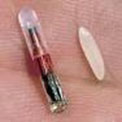One in 3 pets will go missing in their lifetime.
Microchipping offers pet owners the only truly permanent method of identifying your pet and linking the animal back to you, the owner. Collar tags can break or become unreadable and tattooing can become illegible. So, if you want to improve your pet's chances of getting home fast and safe in case it were to go missing, microchipping is your best option.
- Only true permanent method of pet identification
- Best chance of your pet returning to you after going missing
- Quick and painless procedure, similar to vaccination
- Lasts for the lifetime of your pet
Call us at 864-467-3951 to schedule an appointment to get your dog or cat microchipped for just $10.



-
My dog always wears a collar and tags why do I need to microchip it?
Collars and tags can be removed or get lost and tattooing can become illegible over time. Microchips are the only truly permanent method of identifying your dog. It lasts for the lifetime of the pet.
-
I have a cat - should I microchip it?
Cats are naturally curious and unpredictable. In the event that your cat strays away from the safety of your home a microchip is your cat's best chance of a fast return.
-
Does microchipping hurt the animal?
Animal microchips are about the size of a grain of rice and are typically implanted just beneath the surface of the skin between the shoulder blades. The process is similar to receiving vaccination through a needle and is painless to pets. Most animals don't even react when the microchip is implanted, though sometimes minor swelling or slight bleeding can occur at the injection site. Once implanted the microchip remains between the shoulder blades just beneath the skin for the rest of the animal's lifetime, becoming a permanent form of identification.
-
What happens if my pet is taken to a shelter or humane society?
All animals that are brought into Greenville County Animal Care are routinely scanned for a microchip, so long as they are safe to handle. In the event that a microchip is present, the staff will contact you based on the contact information associated with your pet's and inform you that your pet has been found.
-
What should I do if my microchipped pet goes missing?
Go to found.org and update the contact information attached to your missing pet’s microchip. The shelter, veterinary office, or other location that scans your pet for microchip information will contact you to retrieve your pet.
-
Is that the letter O or a zero at the beginning of my microchip number?
There are no letter O's in any Microchip ID it is ALWAYS a numerical zero.
-
If my pet is lost how does the chip work?
The microchip holds a unique identification number. This number is also stored in the company’s database with which your microchip is registered, linking it to your contact information, pet details and your pet's vet information. Animal shelters, rescues, vets and humane societies nationwide scan each found pet as a standard procedure, and should a microchip be detected, your information can be quickly found and you will be called.
-
What if I'm not available when you call?
If we cannot reach you we will leave a voicemail and contact your emergency contact as well. In that time, we will ask the finder of your pet to keep it safe. If they cannot do that, we will ask them to bring it to Greenville County Animal Care.
-
Is the microchip a GPS device?
Pet microchips are NOT GPS devices. The location of a lost pet cannot be searched using a microchip.
-
How long will a microchip last? Do they get replaced?
The microchips used to identify pets will last a lifetime. Once they are implanted in a pet, they will help identify that pet during its lifetime and won't need to be replaced.
-
What else can I do to make sure my pet will be returned if they go missing?
The collar tag is the first line of contact if your pet ever becomes lost. Your pet's microchip is like insurance, meaning they are easily identified if they lose their collar and/or tags. If your pet is lost, the combination of the collar tag and microchip will help get them home fast and safe.
-
Are pets ever allergic to microchips?
Microchips are biocompatible. This means that they are designed to be compatible with a pet's body tissue and not cause an allergic reaction when professionally implanted.
-
Does the microchip ever move in the body?
Microchips are safely contained in biocompatible glass to prevent any movement. When implanted by a staff person trained and certified to implant microchips, there is very little chance of the microchip moving.
-
How old does my pet have to be for a microchip?
We microchip pets of all ages. However, because of the size of the microchip needle, it can be difficult to microchip very young puppies and kittens - especially those weighing less than five pounds.



